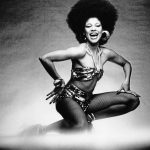Family members, friends and fans are remembering the public and private sides of pioneering funk musician Betty Davis of Homestead.
The cult figure and subject of a 2017 documentary, “Betty — They Say I’m Different,” died Wednesday at 77.
To her niece, Cheana Mabry of Carrick, she was the quiet Aunt Betty who woke her every morning for school.
To audio engineer Christopher Strollo of Highland Park, who recorded her story for the documentary, she was “as bold as bold could be” for a Black woman musician working in the 1960s and ’70s.
To Danielle Maggio of Garfield, who also met her through the documentary, she was a mentor and friend.
“She was surrounded by a small group of people who loved her dearly. It is hard to describe with words what a sweet, perceptive, magical and utterly unique person she was,” said Damon Smith, producer of the documentary. “We spoke on the phone twice a week and were very close, so it’s hard for me to even register that she’s gone.”
As described in Rolling Stone, Davis “left an underappreciated yet trailblazing body of work” in recordings made from 1964 through 1975.
Born in North Carolina, Davis was 12 when her family moved to Homestead. Her father worked in a steel mill.
After high school, she moved to New York City to study clothing design at the Fashion Institute of Technology. She modeled for various fashion magazines and became a figure in the Greenwich Village Club scene, where she clicked with rock stars like Jimi Hendrix and Sly Stone.
Under her birth name, Betty Mabry, she recorded her first single, “The Cellar,” in 1964.
Davis married jazz legend Miles Davis in 1968, and continued to use her married name professionally, even though the union lasted only a year.
Among her compositions is the Chambers Brothers song “Uptown (to Harlem),” which was featured in the Oscar-nominated 2021 documentary “Summer of Soul,” directed by Questlove.
“One of the famous statements from Miles Davis was that Betty was Prince and Madonna before Prince and Madonna,” Strollo said. “They were considered ground-breakers in the frank sexuality in their music and how they represented themselves to an audience in a burlesque sort of a way.
“She was doing that way before them, and more boldly than anyone at the time, and got into a lot of trouble for it.”
Though Davis’ music earned her cult figure status, it never reached the heights of commercial success. Her sexually suggestive lyrics got her songs banned from radio airplay. Recently, there’s been a resurgence of interest in her albums, which have been reissued on Light in the Attic Records.
Davis made an abrupt exit from the music industry in the early 1980s and returned to Pittsburgh, where she led a quiet life until her death.
“After her brief, impactful music career, mental health challenges forced her to return home to live with her mother. During that time, many thought she was in hiding and did not want to be found. This is not true,” said Connie Portis of Homestead, who was friends with Davis for 65 years. “Betty was receiving help to find a balance in her life, while continuing to write music and oversee her music business.”
In 2019, Davis wrote and produced her final song, “A Little Bit Hot Tonight,” featuring Maggio on vocals.
With the release of the documentary, Portis said, “Betty reconnected with friends from around the world and made new and loving friends who produced the film. Her physical health declined rapidly within a two-week period after being diagnosed with cancer.”
In addition to her niece and great-nephew, Kaden Mabry, Davis is survived by first cousins Nicky Neal and Larry Johnson, both of North Carolina.
Neal and Johnson were members of Davis’ 1970s band, Funk House. Drummer Neal and bassist Johnson played on Davis’ albums, “Nasty Gal” from 1975 and “Is It Love Or Desire” from 1976. They also appear in the documentary, Maggio said.
No funeral services are planned.
“At a time to be announced, we will pay tribute to her beautiful, bold and brash persona,” Portis said.
‘She loved her family’
In the mid-1990s, Cheana Mabry lived with her grandparents and Aunt Betty for a year. That’s where Davis performed the morning wake-up duties.
“Early in the morning she would get me up for school, but other than that, she didn’t interact too much,” Mabry said. “I don’t know what she was going through. No one came to the house for her and she didn’t have a boyfriend.”
After that year, Mabry had little contact with Davis until her own father was hospitalized before his death in 2017. While going through her father’s mail, Mabry found a letter from Davis.
“She was concerned because she hadn’t spoken to him for some time. They may have had an argument, and she thought that was why they hadn’t spoken, but in reality it was because he was sick,” Mabry said.
Mabry called the phone number in the letter, and then Davis “was there every moment while my dad was sick. She was there with me in the hospital every step of the way. She loved her family dearly.”
Aunt and niece went on to have regular visits, going out to lunch or just sipping tea and talking.
“She was just a different individual, how she carried herself, how particular she was,” Mabry said. “I don’t want to share too much (of our conversation) because of what a private person she was.”
The conversations didn’t include Davis’ time in the music industry, though.
“She never wanted to talk about that, and I don’t know why. Maybe she wasn’t proud of it,” Mabry said. “She never wanted to tell me much about that part of her life.”
‘As bold as bold could be’
After an inauspicious first meeting, Davis did talk to Christopher Strollo about her music.
When the documentary “They Say I’m Different” was in the very early stages, Strollo was approached by producer Smith about recording interviews with Davis.
The plan was for Smith to interview Davis via phone, while Strollo sat in the room with Davis to record her responses. The first session was held in Davis’ attorney’s office in downtown Pittsburgh.
“I was probably the first person in about 30 years to conduct an interview with her. I would not call that first session successful,” Strollo said. “She was pretty unresponsive initially. She was asked to do a series of interviews and she agreed, but at the end of that interview she said, ‘I don’t want to do this any more.’
“We thought we were done.”
About a week later, Davis reconsidered and later interviews — about six hours’ worth — were conducted in her Homestead apartment.
She agreed to make the recordings and let them be transcribed, but she did not agree to let her curent image be used, Strollo said. She did not allow a camera in those sessions.
What did emerge from the sessions was the portrait of “a remarkable, remarkable person — a bold, strong female voice,” Strollo said. “In the late ’60s and early ’70s, she was breaking a lot of ground in terms of what was acceptable for a Black woman to be doing at that time.
“She was as bold as bold could be for a woman,” he said. “I can’t emphasize enough the contrast of what she was and what she had become by that time. Someone who was so bold and out there and now has become such an introvert and wanting to so stay out of the public eye is the sad story of Betty. It’s so sad that it happened to her.”
Off the record, the pair talked about the music they liked, and Davis gave Strollo a complete set of her reissued albums on CD.
“She mentioned she liked Bruno Mars,” Strollo said.
‘Visionary, pioneering Black woman’
“I went to school to study soul and funk women from the ’60s and ’70s who never got their proper due,” said Maggio, an ethnomusicologist, educator and musician who earned her Ph.D. from the University of Pittsburgh in November.
As a teaching assistant at Pitt, she taught about Davis and played her songs in a world music class.
“Students were writing about her in their final projects and comparing her to Beyonce and Rihanna and Nicki Minaj and all these fierce, unapologetic, amazing Black women who are queens of the music industry now,” she said.
Maggio saw a fundraiser for “They Say I’m Different” on Indiegogo. Along with her $100 donation, she wrote a message on her interest in Davis’ music.
Director Phil Cox reached out and said he wanted to film her teaching a class on Davis. The clip didn’t make the final cut, but it did result in her sharing her research with Cox, representing the film at various openings, getting associate producer credit and — most importantly — meeting Davis.
“We became immediate friends. After that first meeting, she gave me her phone number and said, ‘Let’s go out to lunch sometime,’ ” Maggio said. “We went out to lunch every week for six or seven years, and the relationship grew into one of collaboration and being colleagues.”
Maggio ended up writing her dissertation on Davis, and is in the process of writing a proposal for a biography of the singer.
“Betty suffered many indignities throughout her career, being a visionary, pioneering Black woman,” Maggio said. “It really wasn’t until the last 15 years when Light in the Attic Records re-released all of her music within this new social context we’re in that she was truly honored and respected.”
The understanding and respect of a new generation of fans meant a lot to Davis, she said.
“For the longest time, when Betty was talked about or written about, it was usually just that she was Miles Davis’ wife or his groupie, or that she had an affair with Jimi Hendrix — which was not true, they were best friends,” Maggio said. “She was always talked about in relation to a man. It’s important to me to have her artistry and genius stand on its own.
“I was a gigantic fan of hers for years before I ever met her,” she continued. “She was a friend, but she was very much a mentor to me. It was a multi-faceted relationship and so special to me.
“I know I’ll never have anything like that again with anybody.”













